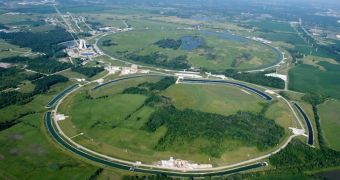Physicists in the United States were left without access to one of the most significant installations a few days ago, when the Tevatron particle accelerator at the Fermi National Accelerator Laboratory (Fermilab), in Batavia, Illinois, was closed down on September 30, 2011.
After serving the cause of modern physics for more than 28 years, it finally came time for the large machine to shut down, and make way for new generations of experiments. Until the Large Hadron Collider (LHC) was completed, the Tevatron was the most important accelerator in the world.
Throughout its years of operation, the facility played a tremendous role in helping fill out numerous blanks in the Standard Model explaining the behavior and interaction of elementary particles. It did so by accelerating protons to energy levels of up to 1 teraelectronvolt (TeV).
At this point, the US is left without a suitable replacement for the Tevatron. However, physicists here are involved with the LHC project, which occupies more than 3,000 scientists around the world. The European installation is capable of reaching an energy level of 7 TeV per beam, Wired reports.

 14 DAY TRIAL //
14 DAY TRIAL //